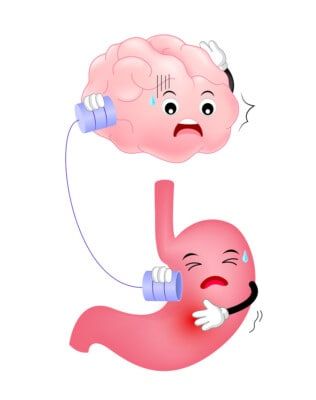
The „abdominal brain“: influence of the intestine on the entire body
Many people underestimate the influence of individual parts of the body on well-being. Above all, the intestine has an important role to play in our health. Because it can do more than digest.
According to recent research, a large part of our immune system can be localized in the intestine. Many doctors also speak of the so-called gut brain.
What is meant by the abdominal brain?
The intestine has its own nervous system, which is similarly complex as that in the brain. This is precisely why terms such as gut brain, gut brain, or second brain have been coined for it.
Researchers are particularly interested in the interplay between the “real” brain, spinal cord and gut brain in this context, and the effects of disruption. In professional circles, this is referred to as neurogastroenterology.
The so-called enteric nervous system, with a network of around 100 million cells, runs through the entire digestive tract.
There are two main networks, the Auerbach’s plexus and the Meissner’s plexus, which are the hub for controlling digestion. The intestinal flora is also counted as part of the gut brain.
In the meantime, researchers know that the two “brains” (abdominal brain and brain) constantly exchange information with each other and can mutually influence each other.
A simple example of this is permanent stress, which in the long term leads to abdominal pain, nausea and digestive problems in most people.
Here the head brain sends appropriate instructions to the intestine brain. But communication also works in the other direction. A bad intestinal condition can thus also lead to mental complaints.
Tip: In the event of a parasitic problem, it may be worthwhile to undertake a special parasite diet. Numerous parasite cure testimonials show that a systemic cure can work wonders.
What are the known diseases of the intestine?
The spectrum of different intestinal diseases is very broad. Often, these are only harmless infections that often disappear on their own after a few days, but sometimes they can become life-threatening.
One of the most common diseases in the intestinal area is the so-called leaky gut syndrome. In German, this means a leaky gut.
Normally, the intestine itself decides which substances to eliminate and which to divert or allow into the bloodstream.
In a healthy intestine, only substances such as trace elements, vitamins, minerals, amino acids and fatty bodies enter the intestine. If the intestinal wall is leaky, harmful substances can also enter the body.
The causes of this disease are often parasites or a biofilm that has settled in the intestine. But malnutrition, especially with foods that are difficult to digest such as legumes or cereals, or an excess of alcohol or sugar can also be the trigger.
Environmental pollution, chronic stress, antibiotics as well as radiation and electrosmog can be responsible as well.
The disease is mainly noticeable through the following symptoms:
- Flatulence,
- Diarrhea,
- Regular abdominal pain,
- Digestive problems.
Nutrition experts therefore recommend a so-called ketogenic diet in cases of illness, which focuses on the intake of the following foods:
- Meat from pasture-raised animals,
- Fish from free catch and clean waters,
- Plantains,
- Soaked flaxseed,
- Foods that contain omega 3 and L-glutamine,
- Yacon syrup (instead of sugar).
However, the most important step is to go to the doctor and take a holistic parasite cure to counteract the infestation of the intestines.
How to keep the intestine healthy?
Before serious intestinal illnesses occur, which can severely affect well-being and general performance, health can be maintained quite easily with a few small measures.
A healthy and balanced diet is not only important for the intestines, but nevertheless plays a decisive role here in particular. The body should therefore be supplied daily with the nutrients it needs.
These include, above all, those six substances that the body cannot produce itself:
- Fats,
- Proteins,
- Carbohydrates,
- Minerals,
- Vitamins,
- Water.
Fresh fruits and vegetables such as Brussels sprouts, broccoli, tomatoes, onions and citrus fruits get a lot of phytochemicals that can protect against colon cancer.
Fiber such as whole grain cereal products, flaxseed, and psyllium are an important food source for the beneficial microorganisms in our intestines.
Salads should be dressed with oils containing unsaturated fatty acids such as rapeseed, safflower or olive oil.
To make it easier to flush toxins out of the intestines, it is especially important to drink enough fluids. Experts advise around two to three liters per day.
Sporting activity increases the requirement even more. Coffee, black tea, alcohol and sugary drinks should be avoided if possible.
Speaking of exercise: Exercise boosts the metabolism. The following endurance sports are especially recommended:
- Running,
- Nordic Walking,
- Cycling,
- Swimming.
But in most cases, a simple daily walk of 30 to 60 minutes is enough. Because this has the important side effect that it significantly lowers the stress level.
Living as stress-free as possible is especially important for intestinal health, as many hormones are formed in the intestines.
In this context, sufficient sleep is also crucial. Every person has a different need here.
Generally speaking: If you get up in the morning and subsequently feel fresh and rested throughout the day, you have slept enough.
For some people, five hours are sufficient for this, while others need ten hours right away. 7.5 hours is considered the optimal amount of sleep, which promises the longest life.
Since toilets are basically improperly designed, a toilet stool should be used that results in being able to assume the natural squatting position at a 35-degree angle.
As a result, the intestines are completely open and can therefore be emptied without any problems.






